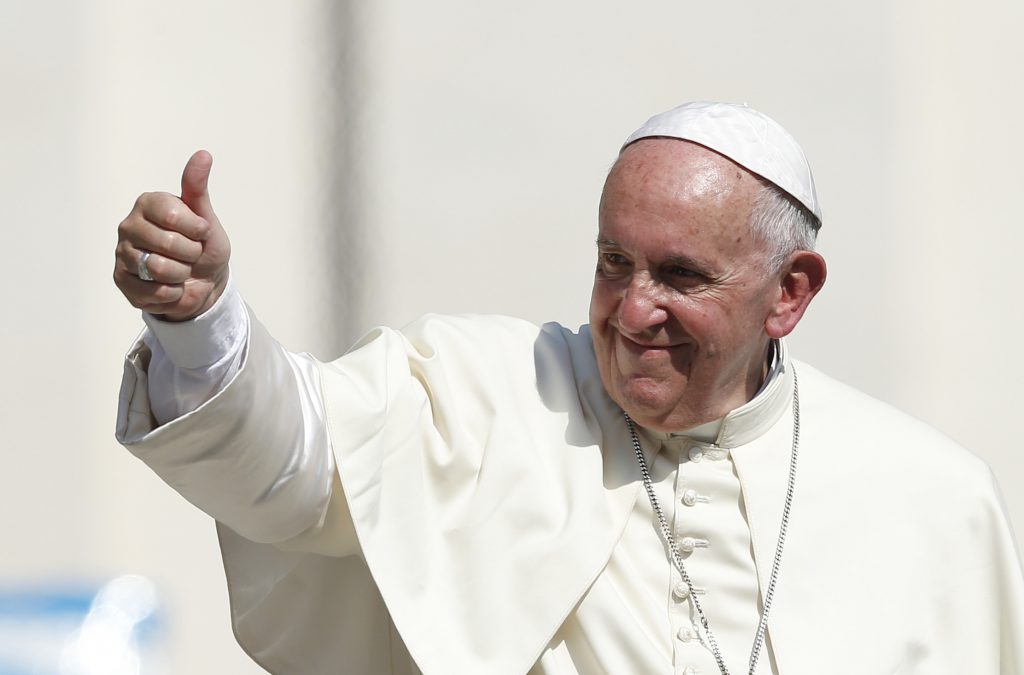Pope Francis – preserve the status quo
January 19, 2018 | Expert Insights

Pope Francis has again stressed the importance of preserving the status quo in Jerusalem and urged fresh talks between Israel and Palestinians on a two-state solution, the Vatican said on Thursday.
Pope Francis
Cardinal Jorge Mario Bergoglio was a relative outsider when he was chosen to succeed Benedict XVI in 2013. Pope Francis, as he became, is the first Latin American and the first Jesuit to lead the Roman Catholic Church.
His election as the 266th pope surprised analysts who may have been expecting a younger man than the 76-year-old. At the time of his election he drew broad support from both Church conservatives and reformers, being seen as orthodox on sexual matters but liberal on social ones.
His supporters liked his "common touch" and his zealous determination to reform the Curia (Vatican bureaucracy), root out corruption in the Vatican bank and deal with the horrific legacy of child sex abuse within the Church.
Four years into his papacy, polls suggest the Pope enjoys high popularity ratings, among Catholics and other faiths. He is followed by more than 15 million people on Twitter. But his willingness to take on issues head-on has also created a growing number of opponents, both within the Vatican and outside.
Background
Experts say, two-state solution is the only way to achieve stability, peace, prosperity and development in Israel & Palestine. The two-state solution refers to a solution of the Israeli–Palestinian conflict which calls for "two states for two groups of people." The two-state solution envisages an independent State of Palestine alongside the State of Israel, west of the Jordan River.
The boundary between the two states is still subject to dispute and negotiation, with Palestinian and Arab leadership insisting on the "1967 borders", which is not accepted by Israel. The territory of the former Mandate Palestine which shall not form part of the Palestinian State, shall be a part of Israeli territory.
History of the two-state solution
The first proposal for the creation of Jewish and Arab states in the British Mandate of Palestine was made in the Peel Commission report of 1937, with the Mandate continuing to cover only a small area containing Jerusalem. The recommended partition proposal was rejected by the Arab community of Palestine and was accepted by most of the Jewish leadership.
Partition was again proposed by the 1947 UN Partition plan for the division of Palestine. It proposed a three-way division, again with Jerusalem held separately, under international control. The partition plan was accepted by the Jewish leadership. However, the plan was rejected by the leadership of Arab nations and the Palestinian leadership, which opposed any partition of Palestine and any independent Jewish presence in the area.
The 1948 Arab-Israeli War for control of the disputed land broke out on the end of the British Mandate, which came to an end with the 1949 Armistice Agreements. The war resulted in the fleeing or expulsion of 711,000 Palestinians, which the Palestinians call Nakba, from the territories which became the state of Israel.
Know more about the background: Future of Jerusalem

Analysis
The Argentine pontiff strongly opposed United States President Donald Trump's bitterly-contested move to recognise Jerusalem as the capital of Israel and his plans to move the US embassy there from Tel Aviv.
Referring to "the unique nature of Jerusalem" in a letter to Egypt's top Muslim cleric Ahmed al-Tayeb, Francis said that "only a special status, guaranteed by the international community, can preserve its identity, (and) unique vocation as a place of peace".
Only in that way "would allow a future of reconciliation and hope for the entire region," he said.
"The Holy See will not cease from urgently calling for dialogue to resume between Israelis and Palestinians for a negotiated solution aimed at the peaceful coexistence of two states," the letter continued.
Jerusalem, which contains sites considered sacred by Christians, Jews and Muslims, is of huge importance to both Israel and the Palestinians and Francis had already urged in December for the "status quo" to be respected.
There were protests in the Middle East and elsewhere over Trump's declaration, a move that drew global condemnation and sparked days of unrest in the Palestinian territories.
Assessment
Our assessment is that the Pope recognizes that a spark in Jerusalem could result in further violence in the region. Palestine has already noted that it would no longer recognize US’ role in the ongoing peace talks between all parties. Any further escalation in the conflict will leave millions of lives vulnerable and at risk. The Pope joins other prominent voices internationally in not only condemning Trump’s controversial decision but also in urging peace talks.








Comments